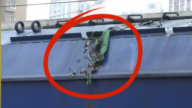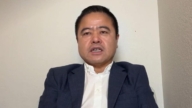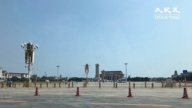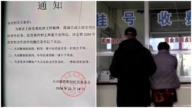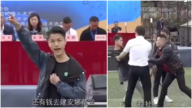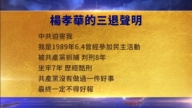【新唐人2014年03月20日訊】一葉落而知天下秋。在中國房地產大亨紛紛走向海外的腳步聲中,浙江一家知名的房地產公司日前轟然倒塌。官方公布它的總負債是35億元,企業法人等已經被當局以所謂的「涉嫌非法吸收公眾存款罪」鋃鐺入獄。中國建商的生存與發展環境到底出了甚麼問題?讓我們聽聽專家的分析。
浙江「興潤置業投資有限公司」,是當地的龍頭房企,已獲國家房地產開發壹級資質,在寧波奉化開發了多個樓盤,曾名列寧波百強企業第33位、建築房企的前5位。
據報導,「浙江興潤置業」總負債為35億多元,企業資產有27億到30億元,實際虧空5億到8億元。目前,企業法人代表瀋明崇和實際控制人——瀋明崇父親瀋財興,因「涉嫌非法吸收公眾存款罪」,11號已經被移送奉化市檢察院。報導說,有證據證實公司非法吸收公眾存款7億多元,借款利息基本為年利率18%到36%不等。
著名經濟學者、天則經濟研究所所長茅於軾:「我覺得非法集資這個罪不能成立的。非法集資這個罪是一個惡法,錯誤的法律。你國家銀行集資就合法,別人集資就不合法?集資不一定做壞事,也可能做好事。集資就是說等於犯罪,這完全是錯了,把它看成是犯罪,那就完全錯了。」
近年來,中國房地產大亨們紛紛投資海外。中國最大的住宅類商品房公司——萬科集團,幾十年以來一直未踏出國門,現在也在新加坡和美國發展業務。董事長王石曾說,下一目標將是英國。另一位房地產巨頭——大連萬達集團,正在英國倫敦的泰晤士河南岸建造一座綜合型酒店。
《中國事務》總編伍凡:「他們危機更大,他們趕快逃跑。因為他們做生意做的這麼大,一定和官方有勾結和聯結。如果和官方關係不好,根本做不起這個生意。遇到這樣的危機的時候,你要麼就找政治上來保護,非常大的政治上的保護,要嘛你就趕快逃跑。不逃跑,你就成了詐騙犯了。這就是共產黨底下的制度造成這批商人兩重命運。」
全美地產經紀商協會(National Association of Realtors)的一項調查顯示,2012年,中國人已成為美國住宅市場第二大海外購買群體,佔美國住宅對外銷量的11%,大大高於2007年的5%。
美國中文雜誌《中國事務》總編輯伍凡認為,這些中國的房地產大亨們是因為看清了北京當局對他們的利用,所以加緊海逃。
伍凡:「共產黨永遠在利用這些民間資本家替他們賺錢。房地產利潤,包括土地價格,包括房子的稅收價格等等,70%的利潤給政府拿去了。開發商拿到15%到20%,就算命大了。當你做不到這一點,它就倒過來吃你。」
對於「興潤置業」,地方當局認為公司資不抵債是因為「經營管理混亂」。但公司內部人士對媒體表示﹕「政府也有脫不開的責任」。因為前幾年樓市好的時候,政府把地價定得很高,企業只能高價拿地。現在樓市狀況不好,政府為賣掉相鄰地段,又把地價定得很低,造成了原先高價購地的公司賣不出房子,最終資金鏈斷裂。
伍凡:「房子賣不出去,資金壓在那裏,還要付利息,你資金周轉不過來,那麼這就出現35億的資金斷裂負債。過去所借的錢,你還不出來,我就關你的門,抄你的家,抓你了。你就變成甚麼?詐騙犯。它只有這樣打,才能維持他們這些政權。」
伍凡認為,「興潤置業」破產絕不是一個個例,而是中國房地產泡沫破裂中的冰山一角。
茅於軾:「房地產泡沫是要破滅的,這個是必然的結果,沒有辦法避免的,但不知道甚麼時候破。空房這麼多,你讓空房都住上人,就消化掉了,要把它消化掉,就不破裂了。」
目前,寧波當地政府希望有企業接盤,不要讓「興潤置業」的樓宇成為爛尾樓。如果成為爛尾樓,受影響最大的恐怕是那些購買了在建樓盤的老百姓們,他們將血本無歸。
採訪編輯/唐音 後製/陳建銘
Tycoon Realtor Bankrupt with 3.5 Billion Yuan Debt
Is it a sign?
While many Chinese real estate tycoons fled abroad,
a prominent Zhejiang real estate developer collapsed.
With an official debt of $ 3.5 billion yuan ($625 million),
its largest shareholder was detained on charges of
‘Illegally absorbing public deposits’.
What happened to the real estate developers in China?
Let’s hear what the experts have to say.
Zhejiang Xingyun Real Estate Company is a local leading
enterprise.
It was certified as the state level real estate developer, and named
the 33rd among the top 100 businesses in Ningbo and the 5th in
real estate companies.
Accordingly, Zhejiang Xingrun Realty, in debt of 3.5 billion yuan,
with a corporate asset between 2.7 to 3.0 billion yuan, had a
deficit of 0.5 to 0.8 billion yuan.
The corporate owners Shen Mingchong and Shen’s father
Shen Caixing were transferred to Fenghua City Procuratorate
on charges of ‘Illegally absorbing public deposits’ on the 11th.
It was reported that the company had illegally absorbed more
than 700 million yuan of public deposits with loan interests of
18% to 36 % per annum.
Mao Yushi, economist and Director of Unirule Institute of
Economics: “I don’t think the crime of illegally absorbing public
deposits can be established.
This ‘illegally absorbing public deposits criminal law’ is in fact a
draconian law.
So, it is legal for the state banks to absorb public deposits, but
illegal for others?
Collecting funds could be for the good.
It is totally wrong to consider fund-collecting as a crime."
In recent years, many Chinese real estate tycoons have invested
overseas.
China’s largest residential real estate company, Vanke Group,
started to invest in Singapore and the United States after decades
of development inside China.
The Chairman Wang Shi said the next target will be the United
Kingdom.
Another real estate giant, Dalian Wanda Group, is building a
comprehensive hotel project on the south bank of the River
Thames in London.
Chris Wu, China affairs magazine editor-in-chief: “Their business
can be this large because of the connections and collusion with
the authorities.
They can’t afford it if they have a poor relationship with the
government.
Under a crisis, they will either need political protection or
escape as soon as possible. Otherwise, they’ll be classified a swindler.
That’s the fate of these businessmen under the Communist regime."
A survey of the National Association of Realtors showed that in
2012,
the Chinese have become the second-largest purchasing group in
the U.S. residential market, accounting for 11 % of overseas sales
of the U.S. residential market,
much higher than the 5% in 2007.
China affairs magazine editor-in-chief Chris Wu analyzes that
these Chinese real estate tycoons have escaped because they
stayed clear of the manipulation of the Beijing government.
Chris Wu: “It is using these private capitalists to make money.
The profits from the real estate, including the taxes, are absorbed
by the government at 70 %.
The realtors should feel lucky if they can get 15% to 20% of the
profits.
When you can’t make that much, it will turn around and bite you."
Local authorities claimed that Xingyun Realty can not repay its
debt because of poor management.
However, company staff complained to the media:
“The Government also has the responsibility."
Years ago when the market was good, the government set a very
high premium for the land, the companies had to pay high to
develop the land.
Now, the government sells nearby land at low prices due to the
bad economy,
which has thus caused the formerly high-priced real estates tumble
in value, and finally break the financial chain.
Chris Wu: “There is no selling, the investment returns are zero,
but there’s still interest on loans that needs to be paid.
The lack of cash-flow will surely result in the 3.5 billion capital
fracture and debt.
Not being able to pay the loan, the government will raid your
home and arrest you on the charge of being a swindler.
That is how the regime maintains its ruling."
Chris Wu believes that Xingyun Realty is by no means an
isolated case, but rather the tip of the iceberg in the Chinese
real estate bubble burst.
Mao Yushi: “The real estate bubble burst is inevitable.
The question is when.
There are so many vacant buildings in China.
If they are all occupied, then it won’t go burst."
Currently, the Ningbo local government is hoping for some
enterprise to take over the construction
of the Xingyun real estate,
otherwise, its many buildings will not be unfinished.
The biggest victims will be the people who paid the premium
to purchased the buildings if they become unfinished projects.
Interview & Edit/Tang Yin Post-Production/Chen Jianming




